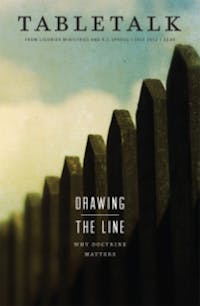
Request your free, three-month trial to Tabletalk magazine. You’ll receive the print issue monthly and gain immediate digital access to decades of archives. This trial is risk-free. No credit card required.
Try Tabletalk NowAlready receive Tabletalk magazine every month?
Verify your email address to gain unlimited access.
There are, when we disagree, almost always two disagreements. Most of the time the smaller disagreement is the bigger one. Consider election. There are some in the church who believe that God chooses who will believe His gospel. There are others who believe God sees beforehand who will believe. This, on the surface, seems to be the root of the loss of peace between these two groups. The second disagreement, however, is over this question: just how important an issue is this?
Though there are surely exceptions, by and large those who don’t believe in election are not known for zealously, aggressively not believing in election. Most don’t meet a new Christian and seek to steer the conversation to election. Those of us who do believe in election, on the other hand, believe it to be an issue of great importance. Did we not so believe, were we able to believe in it silently, in the quiet of our own minds, the way non-election believers don’t believe in election silently and in the quiet of their own minds, we might be able to get along better with others.
When, therefore, we seek to rightly draw lines, the issue is almost never the issue. The challenge is in knowing not just what’s right and what’s wrong, but how important something is. Each of us thinks we’ve mastered this art, and we can’t understand why others don’t just get in line. Intellectually speaking, we are driving down the highway frustrated with those poky drivers who slow us down and irritated by those crazy drivers who whiz by us. We consider those who are more forgiving of the first error to be latitudinarian, slippery, while those who are less forgiving of the second error, we consider to be judgmental and lacking in grace. We end up thinking that the real problem with the church is that everyone isn’t like me.
That we disagree on where to draw lines, however, doesn’t mean there are no correct answers. It simply means that we have a hard time agreeing on the answers. We disagree about when Jesus is coming back, which says nothing at all about the glorious truth that He is coming back. He knows when He is coming back, and that is the most important thing.
Our calling is to get our priorities in line with the one Man who always had them right: Jesus. Let Him who is without sin cast our vision. When we begin to look at things through His eyes, honestly, without recasting Him in our own image, we find not just the right answers but the right priorities. We find that instead of arguing over tithing, we ought actually to be tithing our mint and our cummin while never losing sight of the weightier matters of the Law, such as justice, mercy, and faithfulness (Matt. 23:23).
We learn here also this important truth: that this truth is more important than that truth doesn’t mean that truth is unimportant. Jesus didn’t say, “Why are you tithing your mint instead of pursuing justice? Why are you carefully weighing out your cummin instead of showing mercy?” Instead He said, “These things you ought to have done.” Being right about the more important things no more excuses being wrong about the less important things than not being guilty of murder proves that you are not a tax-cheat. Majoring on the minors, shouting where God has whispered, those are bad things. Neglecting the minors or being silent where God has whispered, those are bad things, too.
Our priorities on what the truly important issues are tend to be determined by what is important to us rather than what is important to Jesus. That is why Jesus warned us. In the Sermon on the Mount, He rightly exposed our selfish ways, noting that we fret and worry about what we will eat and what we will drink. He pointed out that such worries ought to describe only those outside the kingdom. We have a different set of priorities. We are to be about the business of pursuing His kingdom. That means, of course, that we need to be about the King’s business. We have no business of our own. We have been purchased by the King. His agenda is to be ours, His goals ours. How often, I wonder, do we draw lines not because we are called to but because we are setting up the boundaries of our own little fiefdoms? Having drawn our lines in the sand, we next build our sand castles, forgetting that the wind and the waves obey only Him.
Our folly in not pursuing the kingdom, then, drives us to pursue the one solution, His righteousness. We stand firm when we ought to bend, we roll over when we ought to stand. Not Jesus. He alone stands, righteous before His Father. And He bends down to lift us up, that we might stand in His arms. Seek first the kingdom of God and His righteousness, and all these things will be added unto you: gratitude, peace, courage, grace, and the wisdom to know and to love as He knows and loves. Who could ask for anything more?
